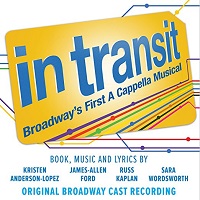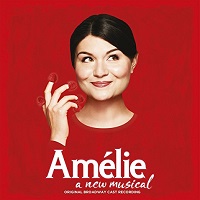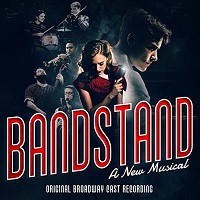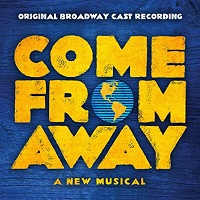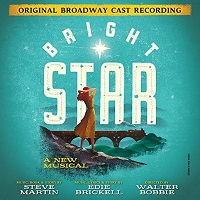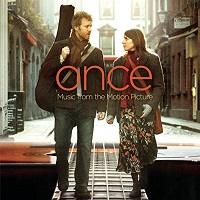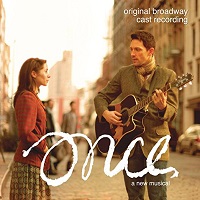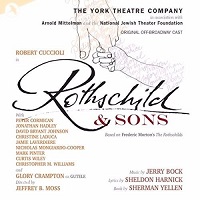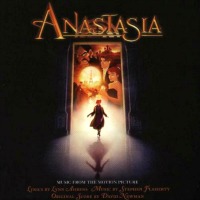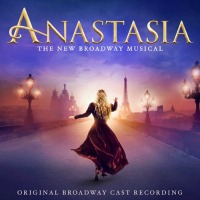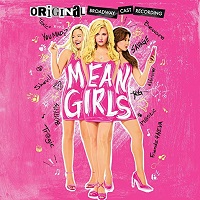 Original Broadway Cast, 2018 (Atlantic)
Original Broadway Cast, 2018 (Atlantic)  (3 / 5) Mean Girls has been a major staple in pop culture ever since the film was released in 2004. With instantly quotable dialogue and numerous iconic moments, the movie is so beloved that it was only a matter of time before the property made its way to the stage as a splashy musical. The plot is similar to Heathers, if a little more family friendly in its delivery: Having spent most of her young life in Africa with her zoologist parents, Cady Heron is thrust into a suburban U.S. high school, where she’s quickly lured in by the appeal of the school’s popular clique, The Plastics , and its glamorous and calculating leader, Regina George (Taylor Louderman). With legendary comedy writer Tina Fey adapting her original screenplay, her husband Jeff Richmond composing the music, and Tony nominee Nell Benjamin providing the lyrics, expectations for the musical were high, but the final product proved to be a mixed bag. Rather than stick to one genre of music, Richmond chose to incorporate golden-age Broadway, rock, bubble gum pop, salsa, and more to reflect the different social cliques of high school. This isn’t a bad idea in theory, and the mixing of different musical styles has certainly been done successfully in many previous shows. But even though John Clancy’s versatile orchestrations accommodate the various genres, they often clash with each other, and many of the songs lack the sort of structure that would allow them to build to a satisfying conclusion. Meanwhile, Benjamin’s lyrics are clever and well crafted but rarely have the bite of Fey’s dialogue (though little of that is presented on the recording). Still, for the most part, the album is an enjoyable listening experience thanks to Richmond’s talent for creating catchy ear worms, as well as the performances of exceptionally talented cast, who do a commendable job of making their mark on characters so strongly associated with the film portrayals. Most successful are Louderman as queen bee Regina and Grey Hansen as the comfortably flamboyant Damien; she revels in Regina’s viciousness, often singing in a low whisper before crescendoing to a commanding high belt, as in the vengeful “World Burn,” while he gives the album Broadway sparkle with his natural comedic timing and brassy vocals. However, it’s Kate Rockwell as Karen, the ditzy member of the Plastics, who has the best song in the score, “Sexy” — a paean to achieving female empowerment by dressing up in skimpy Halloween costumes. Here, Richmond brings musical theater know-how to the bubble gum music, and Benjamin’s lyrics are genuinely funny (“This is modern feminism talkin’ / I expect to run the world in shoes I cannot walk in”). In this song, Mean Girls the musical briefly reaches the same satirical heights as its source material. — Matt Koplik
(3 / 5) Mean Girls has been a major staple in pop culture ever since the film was released in 2004. With instantly quotable dialogue and numerous iconic moments, the movie is so beloved that it was only a matter of time before the property made its way to the stage as a splashy musical. The plot is similar to Heathers, if a little more family friendly in its delivery: Having spent most of her young life in Africa with her zoologist parents, Cady Heron is thrust into a suburban U.S. high school, where she’s quickly lured in by the appeal of the school’s popular clique, The Plastics , and its glamorous and calculating leader, Regina George (Taylor Louderman). With legendary comedy writer Tina Fey adapting her original screenplay, her husband Jeff Richmond composing the music, and Tony nominee Nell Benjamin providing the lyrics, expectations for the musical were high, but the final product proved to be a mixed bag. Rather than stick to one genre of music, Richmond chose to incorporate golden-age Broadway, rock, bubble gum pop, salsa, and more to reflect the different social cliques of high school. This isn’t a bad idea in theory, and the mixing of different musical styles has certainly been done successfully in many previous shows. But even though John Clancy’s versatile orchestrations accommodate the various genres, they often clash with each other, and many of the songs lack the sort of structure that would allow them to build to a satisfying conclusion. Meanwhile, Benjamin’s lyrics are clever and well crafted but rarely have the bite of Fey’s dialogue (though little of that is presented on the recording). Still, for the most part, the album is an enjoyable listening experience thanks to Richmond’s talent for creating catchy ear worms, as well as the performances of exceptionally talented cast, who do a commendable job of making their mark on characters so strongly associated with the film portrayals. Most successful are Louderman as queen bee Regina and Grey Hansen as the comfortably flamboyant Damien; she revels in Regina’s viciousness, often singing in a low whisper before crescendoing to a commanding high belt, as in the vengeful “World Burn,” while he gives the album Broadway sparkle with his natural comedic timing and brassy vocals. However, it’s Kate Rockwell as Karen, the ditzy member of the Plastics, who has the best song in the score, “Sexy” — a paean to achieving female empowerment by dressing up in skimpy Halloween costumes. Here, Richmond brings musical theater know-how to the bubble gum music, and Benjamin’s lyrics are genuinely funny (“This is modern feminism talkin’ / I expect to run the world in shoes I cannot walk in”). In this song, Mean Girls the musical briefly reaches the same satirical heights as its source material. — Matt Koplik
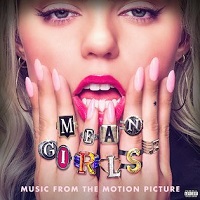 Motion Picture Soundtrack, 2024 (Interscope)
Motion Picture Soundtrack, 2024 (Interscope)  (1 / 5) After the Mean Girls musical had a successful run on Broadway, Tina Fey and her team reassembled to bring the property back to the screen. Their efforts yielded mixed results. While the new movie is harmless, it can’t decide whether it’s an actual screen version of the stage musical or just a Gen-Z update of the 2004 original. The soundtrack is even more flavorless; while the score’s main problem on Broadway was having too many musical personalities, the movie iteration suffers from a lack of personality completely. Although most of the biggest duds from the stage show were cut, what remains is hardly thrilling, as Jeff Richmond has rearranged many of the songs to play like pop hits. For example, “Stupid with Love” and “Someone Gets Hurt” were not that great to begin with, but now they have all the appeal of dead fish. The colorless arrangements and heavy auto-tune also weaken songs that were once highlights of the Broadway recording, such as the clever “Sexy,” stripping them of their individuality and bite. If the new cast, packed with up-and-coming TV/film actors, is game, only a few of them succeed here. Reneé Rapp steps in as Regina, after having taken over for Taylor Louderman in the Broadway production. Her icy tone and “too cool for school” attitude properly fit the Queen Bee role, and her expansive voice helps turn Regina’s vengeful “World Burn” into one of the few bright spots of the recording. Auli’i Cravalho, as scheming outsider Janis, is the other MVP. She does what she can with the cutesy anthem “I’d Rather Be Me,” and she shares with Jacquel Spivey as Damian the best cut on the album: “Revenge Party,” which tracks the duo’s scheme with heroine Cody to take down Regina, is the only song on the soundtrack with a dramatic motor. Unfortunately, sitting right in the center of everything is Angourie Rice as Cady. Rice has a likable presence in the film, but her voice is just too thin and wispy to carry any weight, making all of her songs easily skippable. — M.K.
(1 / 5) After the Mean Girls musical had a successful run on Broadway, Tina Fey and her team reassembled to bring the property back to the screen. Their efforts yielded mixed results. While the new movie is harmless, it can’t decide whether it’s an actual screen version of the stage musical or just a Gen-Z update of the 2004 original. The soundtrack is even more flavorless; while the score’s main problem on Broadway was having too many musical personalities, the movie iteration suffers from a lack of personality completely. Although most of the biggest duds from the stage show were cut, what remains is hardly thrilling, as Jeff Richmond has rearranged many of the songs to play like pop hits. For example, “Stupid with Love” and “Someone Gets Hurt” were not that great to begin with, but now they have all the appeal of dead fish. The colorless arrangements and heavy auto-tune also weaken songs that were once highlights of the Broadway recording, such as the clever “Sexy,” stripping them of their individuality and bite. If the new cast, packed with up-and-coming TV/film actors, is game, only a few of them succeed here. Reneé Rapp steps in as Regina, after having taken over for Taylor Louderman in the Broadway production. Her icy tone and “too cool for school” attitude properly fit the Queen Bee role, and her expansive voice helps turn Regina’s vengeful “World Burn” into one of the few bright spots of the recording. Auli’i Cravalho, as scheming outsider Janis, is the other MVP. She does what she can with the cutesy anthem “I’d Rather Be Me,” and she shares with Jacquel Spivey as Damian the best cut on the album: “Revenge Party,” which tracks the duo’s scheme with heroine Cody to take down Regina, is the only song on the soundtrack with a dramatic motor. Unfortunately, sitting right in the center of everything is Angourie Rice as Cady. Rice has a likable presence in the film, but her voice is just too thin and wispy to carry any weight, making all of her songs easily skippable. — M.K.


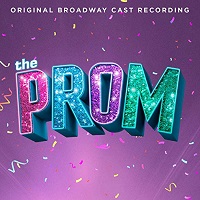
 (4 / 5) The Prom might be described as an old-fashioned musical comedy with a modern sound and up-to-the minute subject matter and plot, about a bunch of vain, self-absorbed, New York theater types who become Social Justice Warriors when they hear that an Indiana high school prom has been canceled to prevent a lesbian student from attending with her girlfriend. The show’s book (by Bob Martin and Chad Beguelin) and score (lyrics by Beguelin, music by Matthew Sklar) offer much hilarity, plus several moments of heartfelt sentiment, as the NYC peeps head to Indiana to try to make everything right. The culture- and ideology-clash results are truly funny through most of the action, yet the show carries a powerful and moving message about inclusiveness. As was the case with the Sklar-Beguelin scores for The Wedding Singer and Elf, the team again provides a clutch of songs notable for pleasing melodies, clever lyrics, and irresistibly catchy “hooks” — such as the sung phrases “One thing’s universal, life’s no dress rehearsal” in “Tonight Belongs to You” and “Build a prom for everyone, show them all it can be done” in “It’s Time to Dance.” As for the ballads, give a listen to “Unruly Heart” and “Dance With You” if you wish to enjoy songwriting of very high quality. The cast is top-notch, with musical comedians Beth Leavel, Brooks Ashmanskas, Angie Schworer, Christopher Sieber, and Josh Lamon all brilliant as the visitors from Broadway, while Caitlin Kinnunen and Isabelle McCalla bring real emotional weight to the relationship of the two girls at the center of the controversy. — Michael Portantiere
(4 / 5) The Prom might be described as an old-fashioned musical comedy with a modern sound and up-to-the minute subject matter and plot, about a bunch of vain, self-absorbed, New York theater types who become Social Justice Warriors when they hear that an Indiana high school prom has been canceled to prevent a lesbian student from attending with her girlfriend. The show’s book (by Bob Martin and Chad Beguelin) and score (lyrics by Beguelin, music by Matthew Sklar) offer much hilarity, plus several moments of heartfelt sentiment, as the NYC peeps head to Indiana to try to make everything right. The culture- and ideology-clash results are truly funny through most of the action, yet the show carries a powerful and moving message about inclusiveness. As was the case with the Sklar-Beguelin scores for The Wedding Singer and Elf, the team again provides a clutch of songs notable for pleasing melodies, clever lyrics, and irresistibly catchy “hooks” — such as the sung phrases “One thing’s universal, life’s no dress rehearsal” in “Tonight Belongs to You” and “Build a prom for everyone, show them all it can be done” in “It’s Time to Dance.” As for the ballads, give a listen to “Unruly Heart” and “Dance With You” if you wish to enjoy songwriting of very high quality. The cast is top-notch, with musical comedians Beth Leavel, Brooks Ashmanskas, Angie Schworer, Christopher Sieber, and Josh Lamon all brilliant as the visitors from Broadway, while Caitlin Kinnunen and Isabelle McCalla bring real emotional weight to the relationship of the two girls at the center of the controversy. — Michael Portantiere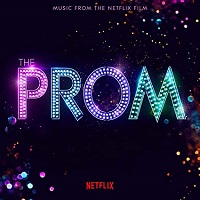
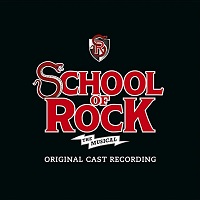

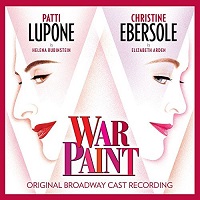
 (2 / 5) Based on the real-life rivalry between cosmetics titans Helena Rubinstein and Elizabeth Arden, with a score by Grey Gardens team Michael Korie and Scott Frankel, War Paint had the potential to be a great musical. Or, at least, with Broadway titans Patti LuPone and Christine Ebersole inhabiting the lead roles, it could have been a highly entertaining one. So it’s unfortunate that the final product played so tepidly on stage. While LuPone (Rubinstein) and Ebersole (Arden) were each in top form, the show never had its leading ladies share a scene together until the very end; instead, they would sing about each other rather than to each other from opposite sides of the stage. This robbed the show of any tension or drama, and it became a “she said/she said” play-by-play of the two women’s lives. On this recording, War Paint fares slightly better, with the stars giving commanding vocal performances, but the album also reinforces that the score is not on par with Grey Gardens. Though Frankel’s jazzy compositions are inventive and tuneful in period-appropriate orchestrations by Bruce Coughlin, several of the songs lack structure and/or don’t build to a satisfying musical conclusion. Korie’s lyrics, meanwhile, are lacking in subtlety or any deep insight regarding the principal characters, making such songs as “If I’d Been a Man” and “My Secret Weapon” much less effective than they might have been. Still, there are two strong 11 o’clock numbers in “Forever Beautiful” (Rubinstein) and “Pink” (Arden), each a reflection on the women’s legacies, which are now being taken away from them in the concluding years of their lives. When the two do get to sing together, as they do in “Face to Face” and “Beauty in the World,” LuPone and Ebersole’s voices blend in a surprisingly effective cohesion that briefly brings the score to a more musically dramatic plain. Douglas Sills and John Dossett also appear as the two men behind the women, but their talents are wasted on the two worst songs in the score, “Step on Out” and “Dinosaurs.” In War Paint, it’s clear that LuPone and Ebersole are meant to be the ones who rule — and they do. But with stronger material, they could’ve really shone. — Matt Koplik
(2 / 5) Based on the real-life rivalry between cosmetics titans Helena Rubinstein and Elizabeth Arden, with a score by Grey Gardens team Michael Korie and Scott Frankel, War Paint had the potential to be a great musical. Or, at least, with Broadway titans Patti LuPone and Christine Ebersole inhabiting the lead roles, it could have been a highly entertaining one. So it’s unfortunate that the final product played so tepidly on stage. While LuPone (Rubinstein) and Ebersole (Arden) were each in top form, the show never had its leading ladies share a scene together until the very end; instead, they would sing about each other rather than to each other from opposite sides of the stage. This robbed the show of any tension or drama, and it became a “she said/she said” play-by-play of the two women’s lives. On this recording, War Paint fares slightly better, with the stars giving commanding vocal performances, but the album also reinforces that the score is not on par with Grey Gardens. Though Frankel’s jazzy compositions are inventive and tuneful in period-appropriate orchestrations by Bruce Coughlin, several of the songs lack structure and/or don’t build to a satisfying musical conclusion. Korie’s lyrics, meanwhile, are lacking in subtlety or any deep insight regarding the principal characters, making such songs as “If I’d Been a Man” and “My Secret Weapon” much less effective than they might have been. Still, there are two strong 11 o’clock numbers in “Forever Beautiful” (Rubinstein) and “Pink” (Arden), each a reflection on the women’s legacies, which are now being taken away from them in the concluding years of their lives. When the two do get to sing together, as they do in “Face to Face” and “Beauty in the World,” LuPone and Ebersole’s voices blend in a surprisingly effective cohesion that briefly brings the score to a more musically dramatic plain. Douglas Sills and John Dossett also appear as the two men behind the women, but their talents are wasted on the two worst songs in the score, “Step on Out” and “Dinosaurs.” In War Paint, it’s clear that LuPone and Ebersole are meant to be the ones who rule — and they do. But with stronger material, they could’ve really shone. — Matt Koplik